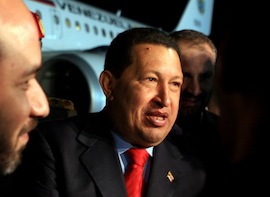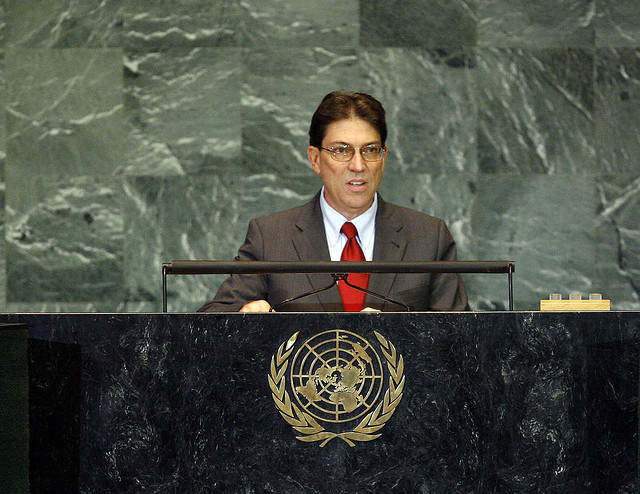
Latin America: Week in Review, Venezuela
Chávez Asks Venezuela National Assembly For Decree Powers
December 15, 2010 By Staff

Venezuelan President Hugo Chávez.
Today in Latin America
Top Story — Venezuelan President Hugo Chávez requested temporary decree powers Tuesday from the country’s National Assembly, the fourth time he has requested deree powers during his 12-year presidency.
The unexpected request, which comes less than a month before a new more opposition-based legislature begins, has brought a fresh wave on tension between Chávez and his critics.
“This is an attempt by the government to minimize the impact of the new General Assembly,” said Leopoldo López, one of Venezuela’s leading opposition politicians, according to The Wall Street Journal.
The request was officially made by Vice President Elias Jaua and lawmakers voted in Chávez’s favor Tuesday, with a final vote on the proposal expected later this week.
The decree powers are intended to push through tax increases and other measures in the aim of helping the country recover from torrential rains that have wiped out crops, destroyed bridges and highways and left 130,000 people homeless, Chávez said.
Opposition members said Chávez’s request raises questions about whether he will agree to hand over power should he lose 2012 national elections.
Dozens of Chávez opponents gathered outside the legislature Tuesday to protest the measure, with one opposition politician quoted as saying the president is consolidating himself as a dictator.
Just Published at the Latin America News Dispatch
- Brazil’s Lula da Silva may be one of the region’s emblematic left-leaning figures, but Nikolas Kozloff’s piece based on WikiLeaks cables concerning Brazil paints a different picture.
- The U.S. Supreme Court grappled last week over whether the state of Arizona has authority to implement standards and penalties on employers who knowingly hire undocumented workers.
Headlines from the Western Hemisphere
North America
- An alleged leader of Mexico’s Arellano Felix drug cartel has been extradited from Mexico to United States, where he will face criminal charges in San Diego.
- New evidence suggests that an explosion at a resort in Playa del Carmen, Mexico was caused by a gas-line leak.
- United States immigration agents found a 13-foot drug tunnel that stretched from the Mexican border to a metered parking space in Arizona.
Caribbean
- The Cuban government is frustrated by the Jamaican government’s lack of action to clamp down on the international drug trade, according to cables made public by WikiLeaks.
- Members of the Interim Haiti Reconstruction Commission met in the neighboring Dominican Republic Tuesday, as Haitian officials and the international community searched for a way to break an impasse over the country’s flawed presidential election.
Central America
- Gold producer B2Gold Corp said drill results from its La Libertad mine in Nicaragua showed the potential to increase projected mine life and gold production at the project.
- Mexico’s América Móvil and Spain’s Telefónica placed bids on Tuesday to offer cell phone service in Costa Rica, pushing the country closer to opening up the state-run wireless telecommunications sector to competition.
- Civil defense authorities in Panama say more than 2,500 homes have been damaged and 10 people killed in more than a week of flooding caused by heavy rains.
Andes
- A U.S. federal grand jury Tuesday indicted 18 alleged members of a leftist Colombian rebel group on terrorism and weapons charges in connection with the hostage-taking of three U.S. government contractors in 2003.
- Urea, a fertilizer vital to crops, is being diverted for use on the plants that provide the raw material for cocaine in central Venezuela.
- A $12.5 billion refinery project in Ecuador is on track and the government hopes to secure financing next year and choose a builder, President Rafael Correa said during a visit to Venezuela on Tuesday.
- Brazilian state oil company Petrobras is in talks with France’s Total to buy a stake in the Bolivian natural gas field Itaú, a Petrobras official said on Tuesday.
Southern Cone
- Violent clashes between government authorities, neighborhood residents, and a group of 1,600 mostly-immigrant squatters in Buenos Aires last week highlight Argentina’s conflict over immigration and a lack of housing and services for immigrants.
- The IMF predicted that economic growth in Uruguay will slow over the next two years, although unemployment in the country is at a record low.
- Argentina now sends more top soccer players abroad than Brazil, with an 800 percent increase over the last five years.
Image: chavezcandanga @ Flickr.





